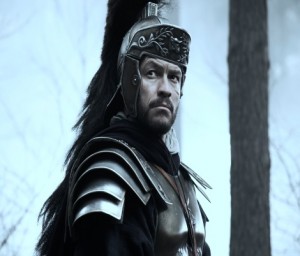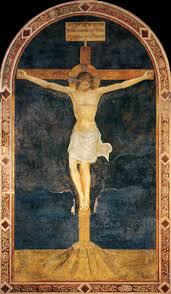Over the last year or two my mother-in- law, who is 86, has become increasingly frail and she is now cared for with great kindness in a residential home. Her mental health in particular is deteriorating and this is manifested by rapid mood swings, outbursts of anger, depression and, perhaps most distressingly, the seeming loss of her life-long Catholic faith. Given that she was brought up in a large, loving Catholic family and attended Mass daily, the personality change affecting her beliefs is particularly painful for those close to her. De Gaulle called old age “a ship-wreck”, a description which is certainly being borne out by her inexorable decline.
As Christians, what are we to make of this? There is no avoiding the fact that for the vast majority of us the prospect of deterioration and death is horrible and frightening. As Philip Larkin chillingly puts it in his poem Aubade: “Most things may never happen: this one will”. In conjunction with many other factors, our starkly increased awareness of innocent suffering and death by means of the global media has meant that predatory atheism, certainly in the West, is on the increase and religion is seen by a growing number to be an irrelevant fantasy.
It was with these sombre thoughts in my mind that I was reading recently the story of the Centurion who asked Jesus to heal his servant (Luke 7:1-10 and Matthew 8:5-14). He sounds a fascinating, hybrid character. In Luke, the Jewish elders describe him as “a friend of our nation” who has “built the synagogue” yet as a serving Roman soldier of significant rank he would almost certainly be imbued with the brutal, compassionless ethic of that empire-building society, whose gods were at best capricious and worst cruel beyond belief. How can it be that such a man would beg help from an itinerant preacher, sprung from the occupied territory, who was considered by many to be the long-awaited Messiah about to overthrow the Roman oppressors? Not only that, he gave Jesus some friendly advice on how to save time in carrying out his healing ministry: no need to make the journey to the centurion’s house, all the teacher needed to do was to say the word here and now and the servant would be well. Is it any wonder that Jesus was astonished and no doubt delighted beyond words at this pagan soldier’s faith?
Centurion Fascinating hybrid
It seems to me that this extraordinary story gives a clue to the very heart of the mystery of human life. The centurion had no real reason to believe Jesus was anything other than a charlatan, yet he trusted him absolutely – he pinned everything he had on the belief that he would help. A powerful, imperious Roman soldier he openly backed Jesus to the hilt, declaring himself unworthy to have this itinerant rabbi under his roof. It seemed never to have entered his head what a profound and public humiliation it would be if Jesus failed to respond. What sort of faith was this? Significantly, the word used in the original Greek version of the New Testament to describe the Centurion’s faith in Jesus is p?st?? (pistin), the same word used after Thomas’s denial, when Jesus says blessed are those who have not seen yet believe (John 20:29); and the word used when Jesus says in distress “when the son of man comes will he find faith on earth?” (Luke 18:7-8). It is the faith Jesus longs to find in our hearts, the trust in God we should nurture as the pearl beyond price (Matt 13:45-46).
For in the end it is trust, and blind trust at that, which touches the very heart of God. Of course there are many reasons for believing in a loving God – the scriptures, the beauty of creation, our innate moral conscience, the love we find in our hearts for family and friends, but all these factors, fundamentally important and helpful though they are, can be countered by a skilled rationalist schooled in the arguments of atheistic philosophy. No, in the final analysis, it is a blind and unrelenting reaching out to God that we must foster – a trust that God loves us tenderly and unconditionally despite the fact that very often we feel the opposite. Jesus demonstrated such a trust on the cross when his ministry was in ruins and his Father was seemingly absent. Why do we think we should be any different to Him?
Two men amongst others have helped me with this:
Many parishioners will remember well Fr Ian Petit from Ampleforth who was based for a few years at St Mary’s Bamber Bridge. He was the greatest speaker I have ever heard. I attended a talk by him many years ago at Brownedge and someone asked a question concerning what happened after death. He said that when we appear before God our loving Father He will not waste time asking us about how many sins we’ve committed or how we should have done better. He will simply ask: “Did you trust me?” His books are available on Amazon.
Fr Ian Petit OSB Fascinating monk
And there is a lovely story by Timothy Radcliffe OP, formerly Master of the Dominicans, which hints at the profound implications of this trust beautifully:
There was once a man travelling in his car along a mountain road. He was meditating on the meaning of life, when he lost concentration and, taking a bend too quickly, he plunged off the carriageway. The vehicle cart-wheeled down the mountainside but, miraculously, he was flung out and managed to grab hold of a root growing from the cliff-side. “Help” he shouted. “Is anyone there?” And a calm, clear voice responded: “yes I’m here and of course I will help you”. The man was astonished and said “Who are you, what should I do?” Why, I’m God of course” said the voice. “And all you need to do is to let go of the root and I will catch you at the bottom”. The man looked down the sheer 200 foot drop and was silent for a while. Finally he cried out: “Is there anyone else there?”
I must come back now to my mother-in-law and what we are to make of her situation. Every day she is visited by one of her three children or a relative, who talk with her or take her out. These visits can be distressing as she is often (though not always!) angry, accusatory and difficult. Yet I know that they show her at all times a love which is active and unconditional. The point is, I think, that although she is often in distress and seems to be losing her life-long faith, God keeps sending his emissaries to reassure her on a daily basis that he tenderly cares for her. Life is what it is, and we must face the fact that there is no satisfactory answer to the problem of suffering. Yet He reminds us in so many ways that He is with us and although the unravelling of our lives in sickness and old age is indeed horrible, his love overcomes it because His son has endured and transformed it.
Like the centurion we must take a risk, we must trust Jesus and astonish Him, for He is making all things new.
Crucifixion by Fra Angelico
“See, I am making all things new” Revelation 21: 5
Socius Novus



